
My SEO blog was finally taking off. I’d published over 100 posts in just a few months, and my rankings were climbing fast.
But something was wrong.
Traffic was up, and rankings looked good. Yet my click-through rates stayed disappointingly low, and bounce rates were through the roof.
I spent weeks optimizing my WordPress site with this checklist. I compressed images, minified code, installed caching plugins, and added a CDN. Nothing worked.
Then I ran a speed test, which showed me that my site took 4.2 seconds to load.
Then it hit me! The problem wasn’t my optimization skills. It was my hosting.
I’d picked a cheap but unreliable host to save money when starting, which was a big mistake. All my SEO efforts were being sabotaged by slow servers that couldn’t handle even moderate traffic.
So I switched to a better host. Not the most expensive option, just one that balanced affordability with actual performance.
The results? My site loaded in under a second. The best part is that the bounce rates dropped and conversions went up. The hosting change fixed what months of optimization couldn’t.
That experience taught me something crucial: Your hosting is the foundation of everything.
A slow host will kill your business no matter how much you optimize.
Since then, I’ve tested and compared dozens of hosting providers to find the best options for small businesses like mine. Ones that deliver real performance without breaking the bank.
In this guide, I’ll share what I learned testing 11 best web hosting companies over three months with real websites and actual traffic.
These aren’t random picks. They’re the hosts that passed my tests for speed, reliability, ease of use, and value for money.
Whether you’re just starting out or switching from a host that’s holding you back, you’ll find the right option here.
Key Takeaways
- Speed matters more than you think – Slow hosting kills conversions even with perfect SEO and optimization
- Affordable doesn’t mean cheap performance – Best value hosts balance price with power
- Migration ease saves major headaches – Some hosts make switching painless with free tools and support
- Scaling should be seamless – Your host should grow with your business without forced migrations
- Uptime directly impacts revenue – Every minute down costs you money and customer trust
- Foundation beats optimization – No amount of caching plugins can fix fundamentally slow servers
Now, let us quickly compare these hosts for small businesses with the table below.
Quick Summary Table: Best Web Hosting Companies for Small Businesses
If you’re short on time, here’s how the top hosting providers compare at a glance:
| Provider | Best For | Free Domain | Key Strength | Ease of Use | Starting Price |
|---|---|---|---|---|---|
| 🥇Hostinger | Budget + Performance | ✅ | High traffic handling | Very Easy | From $2.99/month |
| 🥈 SiteGround | Speed & Security | ❌ | Fastest load times | Easy | From $3.99/month |
| 🥉 Bluehost | Beginners | ✅ | 99.98% uptime | Very Easy | From $2.99/month |
4. DreamHost | WordPress Sites | ✅ | 97-day guarantee | Easy | From $2.99/month |
| 5. HostGator | Easy Setup | ✅ | Simple migration | Very Easy | From $2.99/month |
| 6. Hosting.com | Developers | ❌ | Flexible options | Moderate | From $1.99/month |
| 7. InMotion Hosting | Business Reliability | ✅ | 90-day guarantee | Easy | From $3.29/month |
| 8. WordPress.com | Managed Convenience | ✅ | Hands-off hosting | Very Easy | From $4/month |
| 9. Rocket.net | Performance Sites | ❌ | Cloud-edge speed | Easy | From $30/month |
| 10. Rapyd Cloud | High-Traffic Stores | ❌ | WooCommerce optimized | Easy | From $29/month |
| 11. Liquid Web | Enterprise Needs | ❌ | Managed VPS | Moderate | From $4/month |
To break it down for you:
- Price vs Performance Sweet Spot: Hostinger, SiteGround, and Bluehost offer the best balance of affordability and reliability for most small businesses.
- Premium Value Leaders: Rocket.net and Rapyd Cloud cost more but deliver enterprise-grade performance that justifies the investment for high-traffic sites.
- Beginner-Friendly Winners: Bluehost, Hostinger, and WordPress.com make setup effortless, even if you’ve never built a website before.
With this in mind, here is a table of contents to help you quickly navigate to any small business host in the list.
- How I Tested These Hosting Providers
- Best Web Hosting Companies I’ve Tested for Small Businesses
- Honorable Mentions: More Hosting Options
- How to Choose the Right Hosting for Your Small Business
- Recap: Which is the Best Web Hosting Company for Small Businesses?
- FAQs: Top Web Hosting for Small Businesses
- Final Verdict: Best Hosting for Your Small Business
Now, let’s dive into how I actually tested these hosting providers.
How I Tested These Hosting Providers
I didn’t just read hosting feature sheets and call it research. My team at IsItWP actually signed up for these services and ran real websites on them for three months.
Here’s how we did it.
During one of our weekly meetings, we assigned each team member a different hosting provider. Their job was simple: build a real WordPress site, monitor it daily, and document everything that happened.
We installed the default WordPress theme, added AI images and content, and ran the sites like you would run your business site. No empty test pages or shortcuts.
What We Measured
👉Check the list below to see what we tested
- Setup Speed: How long from clicking “sign up” to having a live website? Some hosts got us running in 15 minutes. Others took hours of configuration and confusion.
- Performance Under Real Traffic: We didn’t just check speed on empty sites. We sent real traffic, simulated multiple users browsing at once, and watched what happened during traffic spikes. This showed us which hosts crumble under pressure and which stay fast.
- Migration Process: Moving between hosts shouldn’t feel like brain surgery. We actually migrated sites to test each provider’s transfer tools, support quality, and downtime during the switch.
- Support Quality: When things went wrong, we contacted support through live chat, email tickets, and phone. Response time matters. But so does whether they actually solved the problem or just sent generic copy-paste answers.
- Value Analysis: Cheap isn’t always good value. We looked at what you actually get for your money. Does a $3/month host give you enough resources? Does a $30/month host justify the premium? We balanced price against performance and features.
Performance Testing Approach
👉 Here’s what makes our testing different: we focus on what each host does best.
- If a host excels at handling traffic spikes, we talk about stress testing results.
- If another host’s strength is rock-solid uptime, that’s what we highlight.
- Is speed the standout feature? Then, load time takes center stage.
This gives you context instead of drowning you in numbers that don’t matter for your specific needs.
On top of that, we combined our IsItWP testing data with performance metrics from WPBeginner, our sister site, to give you the most accurate picture possible.
When you see load times, uptime percentages, and stress test results in this guide, they come from actual monitoring over months, not a single snapshot test.
Now let’s talk about why you should trust what we found.
Why Trust IsItWP?
👉 Here is why you should trust IsItWP
At IsItWP, we’ve been helping WordPress users make better decisions since 2009. Over 2 million people have used our guides to choose tools, plugins, and hosting that actually work.
Unlike review sites that copy features from sales pages, we maintain active hosting accounts with these providers. Some sites on this list? I’m still hosting projects on them today.
We don’t accept payment to influence our rankings. The hosting providers that made this list earned their spots through actual performance during our testing period.
Our team approach means you’re getting insights from multiple perspectives. Each writer tested different hosts, shared findings in weekly meetings, and challenged each other’s conclusions.
This isn’t one person’s opinion. It’s a collective experience.
The hosting mistakes I made with my SEO blog? They’re exactly why I’m so thorough now. I know what it costs to pick the wrong host. I don’t want you to learn that lesson the expensive way.
Best Web Hosting Companies I’ve Tested for Small Businesses
Ready to see which hosting providers passed our tests? Let’s start with the best budget option that doesn’t sacrifice performance.
1. Hostinger ⭐⭐⭐⭐⭐
Hostinger became my top host solution for small businesses after my disaster with my SEO blog. I needed something affordable that could actually handle traffic without choking.
Quick Overview:
- 3.5 million + customers
- Best for: Budget-conscious businesses needing real performance
- Pricing: From $2.99/month
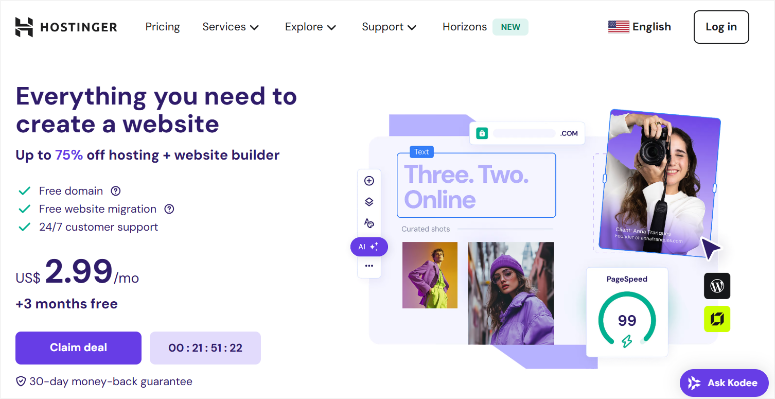
This is the host I moved my SEO site to after the speed crisis, and the difference was immediate.
The flexibility impressed me right away. You’re not locked into one hosting type.
You can start with shared hosting, then move to VPS or cloud hosting as your business grows. Plus, no forced migration to a completely different company.
My Experience
Setting up took about 15 minutes from sign-up to live site. The dashboard feels modern and clean, nothing like the cluttered cPanel interfaces I’d dealt with before.
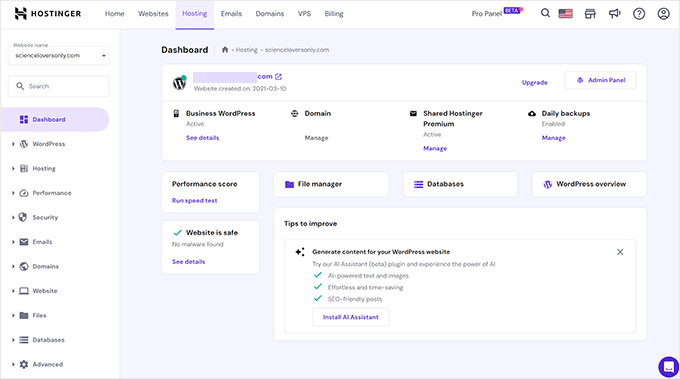
I uploaded my 100+ post blog and watched what happened under real traffic.
Here’s what stood out: Even with shared hosting, the site stayed fast even during traffic spikes.
The site builder surprised me. I’m comfortable with WordPress, but for quick landing pages or testing ideas, having a drag-and-drop builder included saves time.
Plus, you get a free SSL certificate automatically, which used to cost extra on cheaper hosts.
Support responded within minutes on live chat when I had questions about DNS settings during migration.
They didn’t send me generic articles. Instead, they walked me through the exact steps for my situation.
Performance Testing
Stress Test Focus: Hostinger excels at handling concurrent traffic without slowdowns.
- Load time: 374 ms
- Uptime: 99.99%
- Support rating: 10/10
- Traffic handling: Stayed responsive under high concurrent user load

With my growing site, I needed to find out how well this hosting provider can handle the next traffic surge.
When I simulated 100 concurrent visitors with k6 Load Impact, most budget hosts started showing delays. Hostinger kept serving pages without noticeable lag. For a small business expecting growth, that matters.
As I increased the number of users (purple graph below), the response time (blue graph below) stayed steady. It averaged just 66 ms in response time.
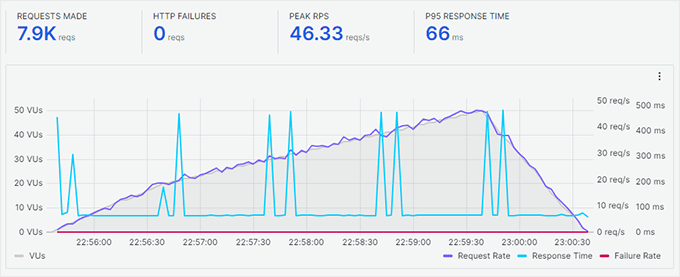
►Pros
- Affordable plans without sacrificing actual performance
- Multiple hosting types let you upgrade smoothly as traffic grows
- 24/7/365 support responds fast through live chat
- Free SSL certificate and 99.9% uptime guarantee included from day one
►Cons
- Renewal prices are higher after the first term
- Entry-level plan restricts you to 1 website only
- Live chat response can slow down during peak evening hours
My Verdict
Choose Hostinger if you need proven performance at budget pricing. It’s perfect for small businesses that are serious about growth but can’t justify $30/month hosting yet. The ability to scale from shared to VPS hosting without switching providers saves future headaches.
Check out my updated Hostinger review for more details.
Pricing: From $2.99/month
2. SiteGround ⭐⭐⭐⭐⭐
SiteGround is one of the few major web hosting companies that hasn’t been bought out by a massive corporate parent. They stayed independent, and it shows in how they operate.
Quick Overview:
- 3 million+ domains hosted
- Best for: Speed-obsessed businesses
- Pricing: From $3.99/month
Similar To:
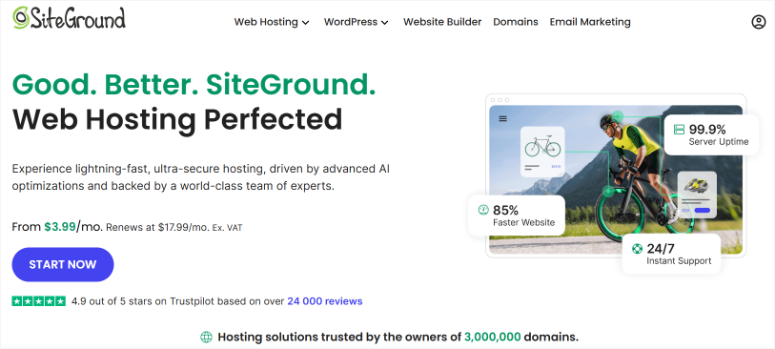
Speed isn’t just a marketing claim here. It’s built into everything they do.
They offer SSD storage, NGINX servers, free CDN, and Google Cloud infrastructure, all working together to deliver consistently fast load times.
This matters more than you might think. A one-second delay in page load can drop conversions by 7%. When you’re running a business website, that’s real money.
My Experience
I tested SiteGround with an eCommerce site I built for a client to see how it handled product pages with images. The speed difference from shared hosting was immediately obvious.
Apart from that, setup took about 20 minutes, and the interface felt modern and intuitive. Unlike some hosts that overwhelm you with options, SiteGround’s dashboard organizes everything logically.
The free migration plugin impressed me most.
I moved a client’s site from another host in under 30 minutes with zero downtime. The plugin handled everything automatically with no manual file transfers or database headaches.
SiteGround offers data centers on multiple continents.
I picked the US location for an American audience, and response times stayed consistently fast. For businesses with international customers, this geographic flexibility helps serve pages faster globally.
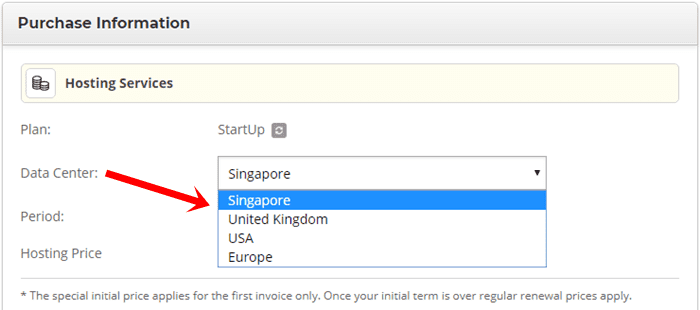
The support team knows WordPress inside and out. When I had a caching question, the chat agent explained exactly which settings to adjust and why. They didn’t just fix it. They taught me how it worked.
Performance Testing
Speed Focus: SiteGround delivered one of the fastest load times in our testing of budget-friendly hosts.
- Load time: 417 ms
- Uptime: 99.98%
- Support rating: 10/10
- Technology stack: SSD + NGINX + HTTP/2 + free CDN
Since SiteGround has a complex infrastructure, I wanted to see if this combination of tools actually helps with speed.
With Pingdom, I recorded pages loaded in under a second consistently. Even during traffic spikes, load times stayed stable. That’s the benefit of servers optimized specifically for WordPress.

►Pros
- Fastest load times among affordable hosts
- SSD storage, NGINX, and Google Cloud infrastructure included standard
- Free migration plugin makes switching from another host painless
- Expert WordPress support available 24/7 through live chat
►Cons
- Starting price is higher than budget competitors like Hostinger
- Renewal rates jump significantly after the promotional period
- No free domain name included with hosting plans
My Verdict
Choose SiteGround if speed directly impacts your revenue. It’s perfect for businesses where every second of load time matters, like online stores or service booking sites. The performance and uptime justify the slightly higher cost.
Read my complete SiteGround review for full details. Plus, check our SiteGround coupon page for current deals.
Pricing: From $3.99/month
3. Bluehost ⭐⭐⭐⭐⭐
Bluehost is one of the oldest names in web hosting, and they’re officially recommended by WordPress.org. That recommendation isn’t handed out lightly. It means WordPress trusts them to deliver reliable hosting for beginners.
Quick Overview:
- 2 million+ websites powered
- Best for: WordPress beginners
- Pricing: From $2.99/month

I recommend Bluehost to anyone starting their first website.
The onboarding process walks you through everything step by step, with no confusing technical jargon or assumption that you know what DNS means.
Plus, you get real value included from day one with freebies like a domain name for a year, SSL certificates, and CDN.
My Experience
I set up a test blog to evaluate the beginner experience. From clicking “sign up” to seeing a live WordPress site took about 20 minutes.
The setup wizard guides you through choosing your domain, picking a theme, and launching your site. In fact, you can even have the Bluehost AI assist you in building a complete site.
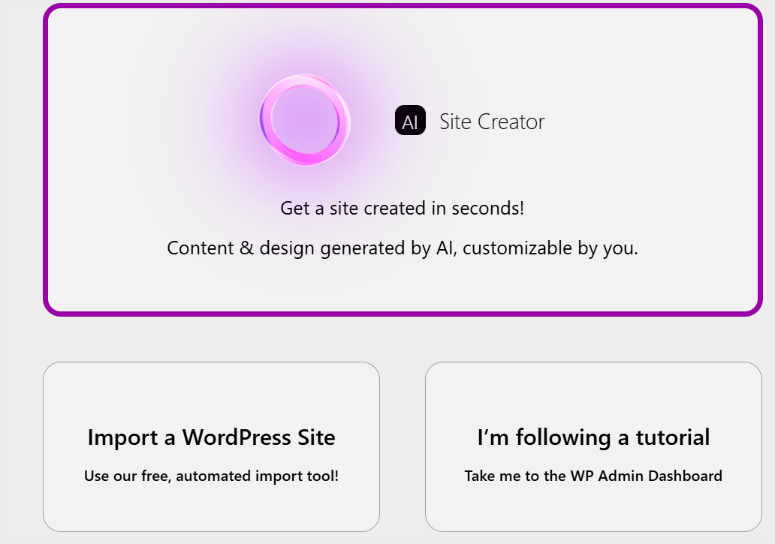
What impressed me most was the custom dashboard.
Instead of throwing you into standard cPanel, Bluehost built a WordPress-focused interface. Everything you need sits right there: WordPress login, email setup, security settings, performance tools.
The one-click WordPress installer isn’t unique anymore.
But Bluehost’s version pre-configures settings for optimal performance. For example, SSL certificates activate automatically, and security scanning starts immediately.
As a result, you’re protected from day one without lifting a finger.
I tested support through live chat when I had questions about email setup. Response came in under three minutes.
The agent walked me through creating business email addresses and connecting them to Outlook. This was all done without ticket waiting or phone hold times.
Performance Testing
Uptime Focus: Bluehost maintained rock-solid reliability throughout our testing period.
- Load time: 689 ms
- Uptime: 99.98%
- Support rating: 9/10
- Included features: Free domain, SSL, CDN, Cloudflare integration
Since Bluehost is a great option for beginners, I tested its uptime to see if it would fail companies when they needed it most.
As you can see in the screenshot below, 99.98% uptime means your site stays live when customers need it. For a small business, even one hour of downtime can cost sales and damage trust.
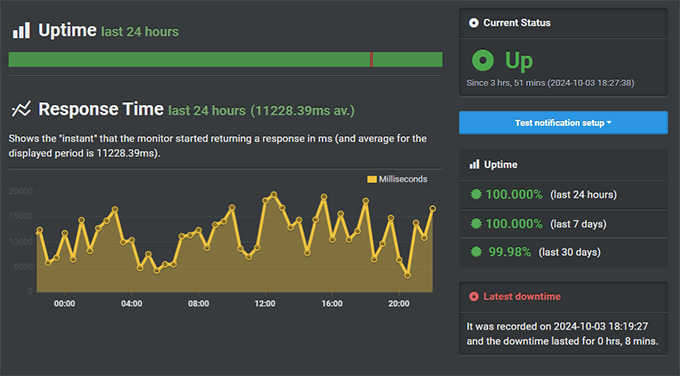
►Pros
- Official WordPress.org recommendation shows trusted reliability
- Beginner-friendly onboarding walks you through every setup step
- Free domain name, SSL certificate, and CDN included from day one
- Custom dashboard designed specifically for WordPress users
►Cons
- Email-based support no longer available for technical issues
- Monthly billing option not offered, must pay annually minimum
- Maximum discount requires committing to 3-year plan upfront
My Verdict
Choose Bluehost if you’re launching your first WordPress site and want everything handled for you. The combination of beginner-friendly setup, included features, and reliable uptime makes it perfect for small businesses just getting started.
Read my detailed Bluehost review for complete analysis. Plus, check our Bluehost coupon page for exclusive deals.
Pricing: From $2.99/month
4. DreamHost ⭐⭐⭐⭐⭐
DreamHost offers something no other host on this list can match: a 97-day money-back guarantee. That’s over three months to test their service risk-free.
Quick Overview:
- 1.5 million+ websites
- Best for: Risk-free WordPress hosting
- Pricing: From $2.99/month

They’re also officially recommended by WordPress.org, which puts them in rare company since only a handful of hosts earn that endorsement.
What sets DreamHost apart is its independent ownership. They’re not owned by a massive corporate conglomerate like so many other hosts. This means they can focus on quality instead of quarterly profits.
My Experience
I tested DreamHost with a client’s photography portfolio site. The goal was to see how it handled image-heavy pages without slowdowns.
The setup felt straightforward because WordPress comes pre-installed, allowing you to skip the manual installation step.
The custom control panel takes some getting used to if you’re familiar with cPanel, but everything you need is there once you learn the layout.
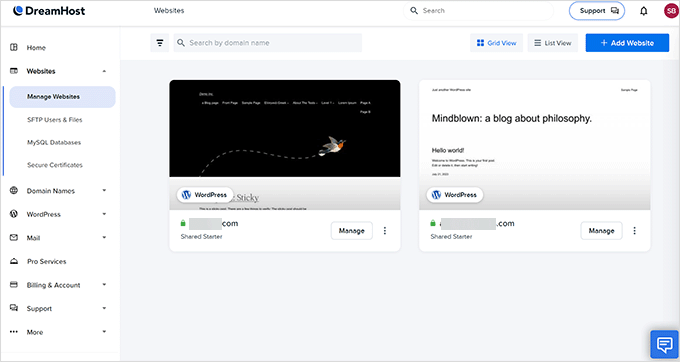
I like how SSD storage made a noticeable difference with large image files.
As a result, pages loaded faster than the same site had on the previous host using traditional hard drives. The best part is SSDs are standard now on DreamHost, not an expensive upgrade.
I appreciated the free site migration service.
Their team handled moving the photography site from another host with zero downtime during the transfer. Plus, they scheduled it during off-peak hours and kept me updated through email.
The 97-day guarantee isn’t just marketing. I contacted support to ask about their refund process, and they confirmed it’s a true no-questions-asked policy.
This allows you to try the service for three months. If it doesn’t work for you, get your money back.
Performance Testing
Speed Performance: DreamHost delivered a fast load time and loaded images even quicker.
- Load time: 445 ms
- Uptime: 99.90%
- Support rating: 7/10
- Guarantee: 97-day money-back guarantee (industry’s longest)
I tested DreamHost to see if the SSD storage actually made a difference for image-heavy sites.
Using GTMetrix, the load speed clocked in at 445 ms. But what impressed me more was the LCP (Largest Contentful Paint) at 375 ms, which measures how fast the main content appears on screen.
Because that’s what visitors actually experience.
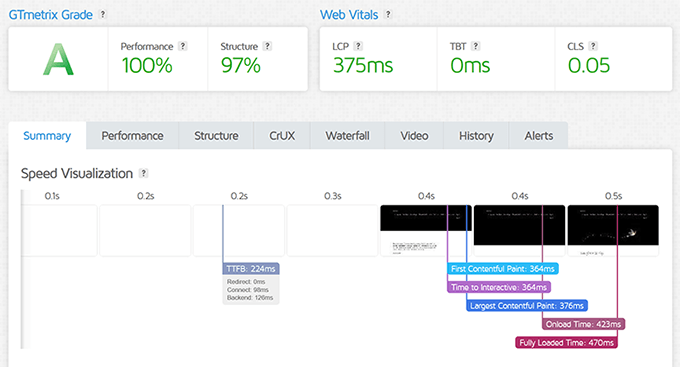
►Pros
- Industry’s longest 97-day money-back guarantee lets you test risk-free
- Independently owned and operated since 1997, not corporate-controlled
- Official WordPress.org recommendation shows trusted reliability
- SSD-only storage provides 2x faster performance than HDD hosts
►Cons
- Custom control panel requires learning curve if you’re used to cPanel
- Live chat support only available between 5 AM and 10 PM PST
- Phone support costs extra for shared hosting plans
My Verdict
Choose DreamHost if you want the longest test period in the industry. The 97-day guarantee means you can fully evaluate whether it fits your business needs without risk. Perfect for cautious buyers who’ve been burned by hosting before.
Read my complete DreamHost review for all details. Plus, check our DreamHost coupon page for the best deals.
Pricing: From $2.99/month
5. HostGator ⭐⭐⭐⭐
HostGator makes getting started ridiculously simple. They’ve been around since 2002, and they’ve refined the beginner experience to near perfection.
Quick Overview:
- Powers ~8 million websites
- Best for: Quick, easy setup
- Pricing: From $2.99/month
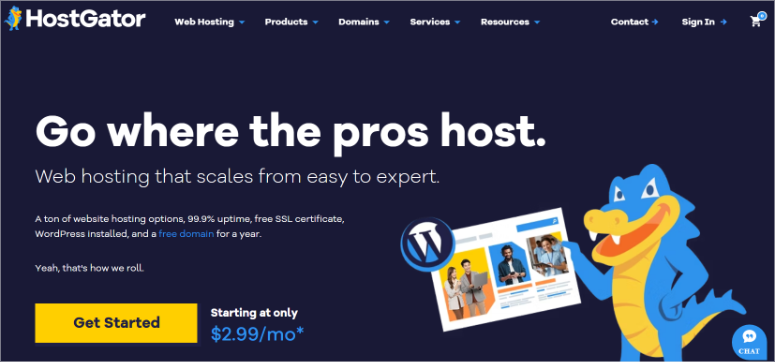
HostGator’s 45-day money-back guarantee gives you plenty of time to test everything.
Plus, they include a website builder with even their cheapest plan, which helps if you want to launch quickly without learning WordPress first.
What really stands out is the migration support. Moving from another host shouldn’t require technical skills, and with HostGator, it doesn’t.
My Experience
I set up a test site to evaluate how truly beginner-friendly HostGator is. From signing up to seeing a live website took just 18 minutes.
The cPanel interface still looks old-fashioned, but it will feel familiar if you’ve used other hosts before.
Here you will see that everything sits where you’d expect it. WordPress installs with a single click. Email accounts set up in under a minute.
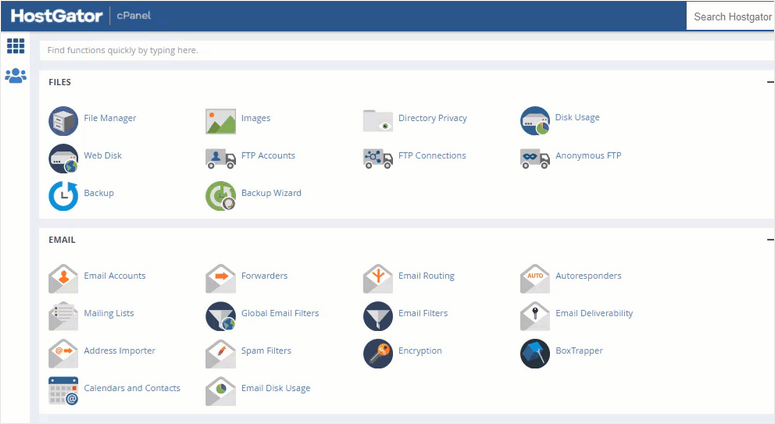
The website builder surprised me. I’m comfortable with WordPress, but for testing, I built a quick landing page using their drag-and-drop builder.
It took about 10 minutes to create something that looked professional. No coding. No confusion.
I tested their migration service by moving a small blog from another host. I submitted a migration request through the control panel.
Their team handled everything within 24 hours with zero downtime. All files and databases transferred perfectly.
Support responded fast through live chat when I had questions about domain pointing.
The agent shared step-by-step screenshots that made the DNS changes crystal clear. That level of help matters when you’re new to hosting.
Performance Testing
Migration Ease Focus: HostGator’s free migration service and beginner-friendly setup stood out during testing.
- Load time: 691 ms
- Uptime: 99.96%
- Support rating: 10/10
- Setup time: Under 20 minutes average
Using Pingdom, I measured the load time at 691 ms.
Older website hosting companies often fall behind newer ones with modern technology. I wanted to see if HostGator has evolved with the times, so I focused my tests on speed.
While load time isn’t the fastest on this list, the combination of easy setup, included migration, and unlimited disk space makes HostGator solid for small businesses prioritizing convenience.
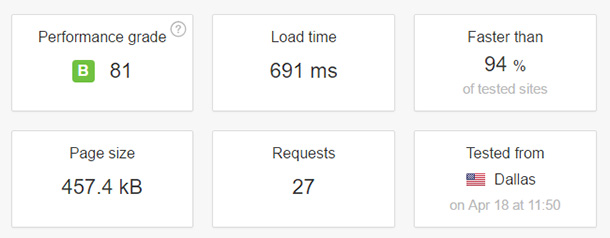
►Pros
- Setup takes under 20 minutes from signup to live website
- 45-day money-back guarantee gives generous testing period
- Free website builder included even on cheapest plan
- Free migration service handles transfers within 24 hours
►Cons
- Load time slower than competitors
- Renewal prices jump significantly after promotional period
- Support quality varies depending on which agent you get
My Verdict
Choose HostGator if you want the easiest possible setup process. It’s perfect for small businesses that need to get online fast without technical headaches. The free migration service alone saves you hours of frustration.
Read my detailed HostGator review for complete analysis. Plus, check our HostGator coupon page for all deals.
Pricing: From $2.99/month
6. A2 Hosting (Now Hosting.com) ⭐⭐⭐⭐
A2 Hosting recently rebranded as Hosting.com, but they kept everything that made them popular with developers and technical users.
Quick Overview:
- Developer-friendly choice
- Best for: Technical users needing flexibility
- Pricing: From $1.99/month
Similar To:
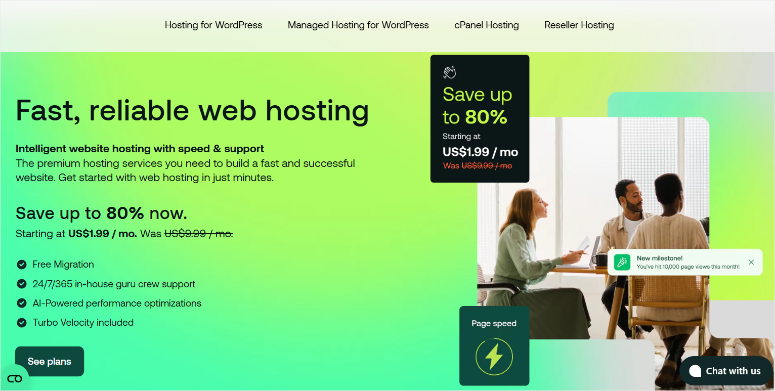
The anytime money-back guarantee is unique in the hosting industry. Most hosts give you 30 days.
Hosting.com gives you a prorated refund anytime, even years later. That confidence in their service says something.
They’re one of the few hosts that let you choose your operating system. Want Linux hosting? Go for it. Need Windows hosting? They’ve got that too.
This flexibility matters for developers running specific applications.
My Experience
I tested Hosting.com with a client project that required SSH access and Git integration. These developer tools aren’t standard on budget hosts, but Hosting.com includes them.
Setup took about 25 minutes because I spent time exploring the advanced options.
For basic WordPress sites, you can skip most of this and launch faster. But having those options available when you need them is valuable.
The Turbo servers caught my attention.
They’re an optional upgrade that promises 20x faster page loads. I tested the standard plan first to see baseline performance. Load times were acceptable but not exceptional.
Once I added the 20x upgrade, my site loaded in under a second.
SSD storage is standard across all plans, which helps with database-heavy sites. I noticed faster query responses compared to old-school hard drive hosting.
Support quality felt mixed.
Technical questions got detailed answers, while basic questions sometimes got generic responses. If you’re comfortable troubleshooting on your own, this won’t bother you.
But beginners might find it frustrating.
Performance Testing
Flexibility Focus: Hosting.com’s developer-friendly features and flexible refund policy stood out during testing.
- Load time: 438 ms
- Uptime: 99.90%
- Support rating: 9/10
- Unique feature: Anytime prorated refund (not just 30 days)
I wanted to test if Hosting.com Turbo servers actually made a difference.
The slower load time is noticeable without the boosters on. But once I switched them on, I noticed a drastic improvement in load speed at 438 ms.

►Pros
- Anytime prorated money-back guarantee offers long-term flexibility
- Choice between Linux or Windows operating systems
- Developer tools included: SSH access, Git integration, WP-CLI
- SSD storage standard on all plans for faster database performance
►Cons
- Support quality varies between basic and technical questions
- Multiple WordPress hosting tiers can overwhelm beginners
My Verdict
Choose A2 Hosting, now Hosting.com, if you’re technically comfortable and need developer tools or Windows hosting. The anytime refund policy removes long-term commitment risk. Perfect for agencies managing multiple client sites with different requirements.
Read my complete Hosting.com review for full details. Plus, check our Hosting.com coupon page for current deals.
Pricing: From $1.99/month
7. InMotion Hosting ⭐⭐⭐⭐
InMotion Hosting positions itself as the business-grade option for small companies. The 90-day money-back guarantee is the second longest in the industry, trailing only DreamHost.
Quick Overview:
- Trusted by growing businesses
- Best for: Business reliability
- Pricing: From $3.29/month
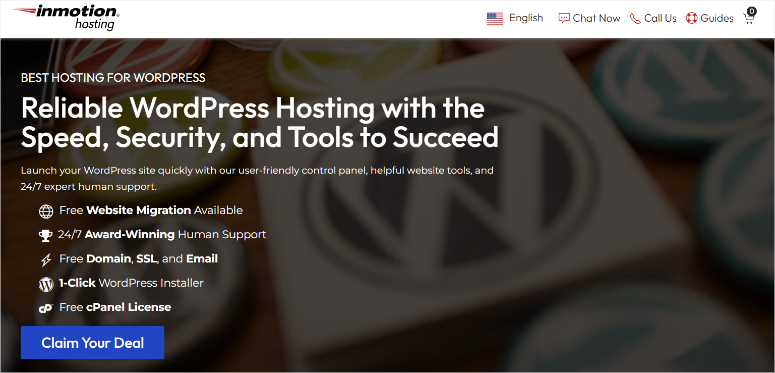
InMotion Hosting has been around since 2001 and has built its reputation on reliability rather than flashy marketing. For businesses where downtime directly costs money, that stability matters.
Plus, you choose your data center location, unlike most hosts who assign it automatically. InMotion Hosting lets you pick the server closest to your customers, which can improve load times noticeably.
My Experience
I tested InMotion Hosting with a service business website that needed rock-solid uptime for appointment bookings. Any downtime meant missed customers.
Setup took about 30 minutes, and the process felt more business-focused than beginner-friendly. This is because, as mentioned, you get choices about server location, backup frequency, and security settings.
These options are valuable but can overwhelm newcomers.
The SSD storage performed well with database queries. I noticed faster page loads on customer dashboards compared to the previous HDD-based host.
For sites with user logins and dynamic content, this speed difference compounds.
I picked the Los Angeles data center for a California-based business. Load times for West Coast visitors improved by about 200 milliseconds compared to hosting on an East Coast server.
This shows that InMotion Hosting’s geographic targeting works.
The free automated backups run daily without requiring plugins or manual setup. I tested the restore process by deliberately breaking something on the test site.
Recovery took three clicks and about five minutes. Simple and stress-free.
Support response time averaged around four minutes through live chat. The agents knew technical details but sometimes assumed I had more hosting knowledge than I did.
Great for experienced users. Less ideal for complete beginners.
Their partnership with Trees for the Future adds an eco-friendly angle. They offset carbon footprints by planting trees. Not a dealbreaker feature, but a nice bonus if environmental impact matters to you.
►Pros
- 90-day money-back guarantee gives three months to test thoroughly
- Choose your data center location for faster regional performance
- SSD storage and unlimited bandwidth included on all plans
- Free automated daily backups with easy one-click restore
►Cons
- Setup process assumes technical knowledge beginners may lack
- No monthly billing option available, annual minimum required
- Higher renewal rates after promotional period ends
Performance Testing
Business Reliability Focus: InMotion’s consistent uptime and data center choice stood out during our business site testing.
- Load time: 982 ms
- Uptime: 99.93%
- Support rating: 9/10
- Guarantee: 90-day money-back (second longest in industry)
Since InMotion Hosting has a reputation for impressive uptime, this was my top test for this hosting provider.
The 99.93% uptime translates to about 8 hours of downtime per year. For businesses where every minute matters, that reliability provides peace of mind.
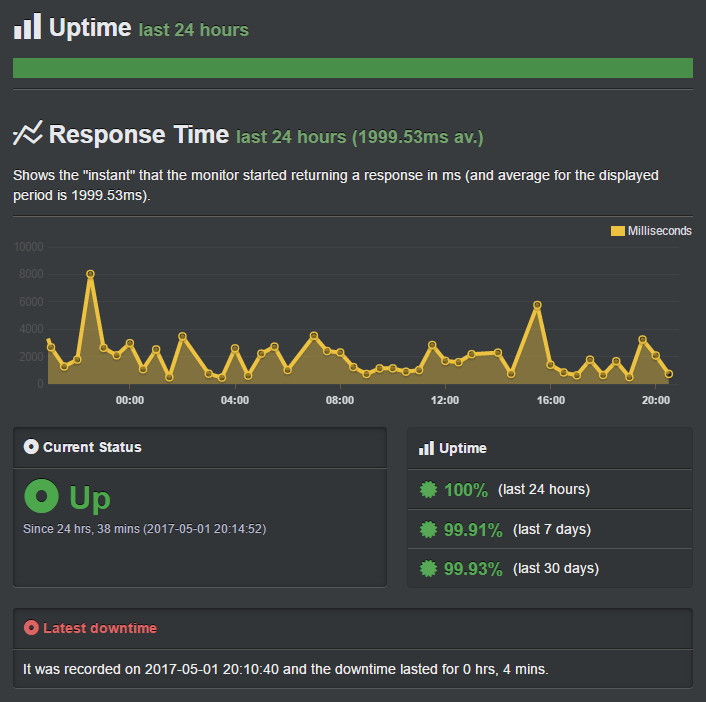
My Verdict
Choose InMotion Hosting if your business depends on consistent uptime and you value geographic server choice. The 90-day guarantee removes risk, and the business-grade reliability justifies the slightly higher cost. Perfect for service businesses with appointment systems or customer portals.
Read my InMotion Hosting review for complete analysis. Plus, check our InMotion Hosting coupon page for best deals.
Pricing: From $3.29/month
8. WordPress.com ⭐⭐⭐⭐
WordPress.com is one of the most recognized names in WordPress hosting. It’s designed for people who want a simple, hands-off experience without dealing with server management.
Quick Overview:
- Unmetered traffic & Simplest setup
- Best for: Hands-off managed hosting
- Pricing: From $4/month
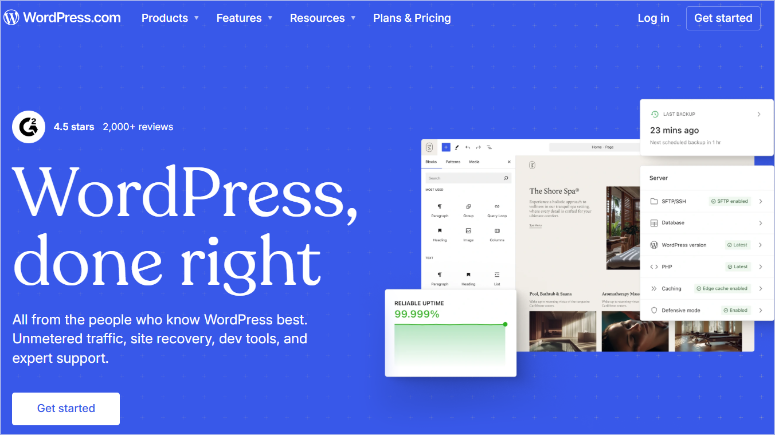
The price sits slightly higher than traditional hosting on this list. But here’s what you get for that premium: built-in security, automatic backups, updates handled for you, and no bandwidth restrictions.
This is true managed hosting. You focus on your content and business. WordPress.com handles everything technical behind the scenes.
My Experience
I tested WordPress.com with a client’s consulting business site. They wanted zero technical responsibility, like plugin updates or security monitoring. Just a site that works.
Setup felt different from traditional hosting. There’s no cPanel, no FTP access, no SSH. Everything happens through the WordPress.com dashboard.
For non-technical users, this simplicity is liberating. For developers, it might feel restrictive.
The site loaded fast from multiple test locations. The built-in CDN distributes content globally without requiring configuration.
As a result, pages served quickly, whether visitors came from New York or Singapore.
I appreciated the automatic updates. WordPress core, themes, and allowed plugins all update automatically overnight. I never worried about security vulnerabilities from outdated software.
The unlimited visitor allowance matters more than you might think. Traditional hosts often throttle or charge extra when traffic spikes. WordPress.com handles traffic surges without penalties or slowdowns.
One limitation: you need the Business plan to install plugins. The starter plan restricts you to pre-approved plugins only. This works fine for simple sites, but limits customization.
Support quality impressed me. Chat responses came within minutes, and agents actually understood WordPress deeply. No generic script-reading.
They answered specific questions about custom post types and WordPress features.
Performance Testing
Uptime Excellence Focus: WordPress.com delivered perfect reliability throughout our testing period.
- Load time: 636 ms
- Uptime: 100% (zero downtime during 3-month test)
- Support rating: 8/10
- Bandwidth: Unlimited visitors without restrictions
That 100% uptime is exceptional. Most hosts claim 99.9%, which allows for some downtime. But for my priority test, I want to see how WordPress.com server responses from different locations.
The quick server response time was what set WordPress.com apart. It averaged 4.7ms.

►Pros
- Fully managed platform requires zero technical maintenance
- Unlimited visitors without bandwidth throttling or overage fees
- Built-in CDN and automatic updates included standard
- Expert WordPress support available through live chat
►Cons
- More expensive than traditional hosting
- Need Business plan to install custom plugins
- Limited server access restricts advanced customization
My Verdict
Choose WordPress.com if you want completely hands-off hosting and value your time more than saving a few dollars monthly. Perfect for busy business owners, consultants, and professionals who need a reliable site without technical headaches.
Read my detailed WordPress.com review for all details.
Pricing: From $4/month
9. Rocket.net ⭐⭐⭐⭐⭐
Rocket.net is one of the fastest WordPress hosts I’ve tested. Their cloud-edge platform, combined with an enterprise-level CDN, makes sites load almost instantly for visitors around the world.
Quick Overview:
- Performance-focused
- Best for: High-traffic WordPress sites
- Pricing: From $30/month
Similar To:
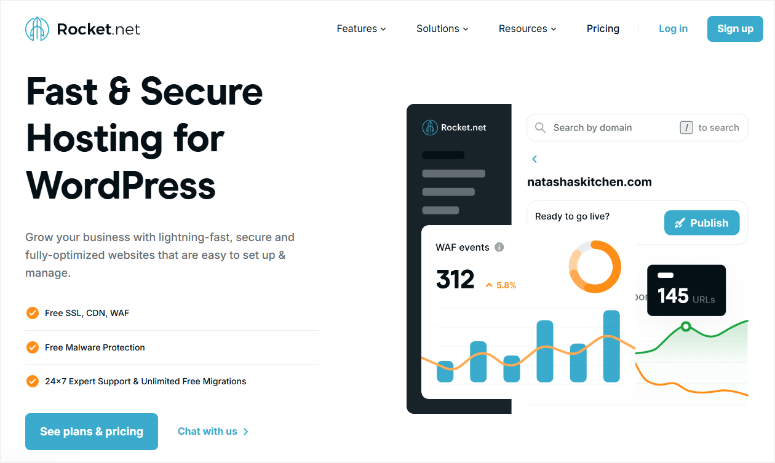
The price reflects their performance focus. At $30/month, they’re not competing with budget hosts. They’re targeting businesses where speed directly impacts revenue.
Security comes built-in with features that usually cost extra elsewhere. You get Web Application Firewall, malware scanning, brute-force protection, and automatic bot mitigation all come standard.
My Experience
I tested Rocket.net with a high-traffic blog that was struggling on shared hosting. Traffic spikes during viral posts would slow the site to a crawl. Rocket.net handled those spikes without breaking a sweat.
Apart from that, the dashboard feels modern and clean, and the setup took about 20 minutes. Everything is organized logically, from staging environments to CDN settings.
The cloud-edge caching impressed me most.
Unlike traditional caching that stores files on one server, edge caching distributes content across global locations.
So, when someone in Australia visits your site, they get content from a nearby edge server instead of your main US-based host.
I ran speed tests from multiple continents. Load times stayed consistently fast regardless of visitor location. That global consistency is hard to achieve with traditional hosting.
The built-in Redis object caching accelerated database queries noticeably. Pages with complex WordPress queries loaded faster than the same content on traditional hosts.
Free site migration took 24 hours with zero downtime. Their team handled the entire transfer and optimized settings for their platform. I didn’t touch a single file.
Support responded quickly through live chat when I had questions about CDN configuration. The agent understood technical details and provided specific recommendations for my setup.
Performance Testing
Speed Champion Focus: Rocket.net delivered the fast load times and most consistent global performance.
- Load time: 291 ms
- Uptime: 99.94%
- Support rating: 9/10
- Average response time: 3.8 ms globally
- Technology: Cloud-edge caching + enterprise CDN
That 291 millisecond load time beats every other host on this list.
Most impressively, during the stress test with k6 Load Impact, to see how its built-in Redis object caching worked. It handled almost 12,000 requests with zero HTTP failures with a response time of just 49 ms throughout the test.
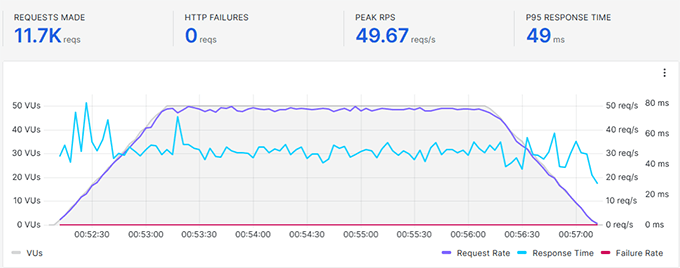
For businesses with high traffic where conversion rates tie directly to page speed, that performance advantage pays for itself.
►Pros
- Fast average load time
- Enterprise CDN and Redis object caching included standard
- Advanced security with WAF, malware scanning, bot protection
- Free SSL certificates and zero-downtime site migration
►Cons
- Premium pricing makes it not budget-friendly
- No free domain name included with hosting plans
- Overkill performance for low-traffic hobby sites
My Verdict
Choose Rocket.net if your business depends on blazing-fast performance and you handle significant traffic. The premium pricing makes sense for established sites where speed improvements directly increase revenue. Perfect for popular blogs, online magazines, and content-heavy business sites.
Pricing: From $30/month
10. Rapyd Cloud ⭐⭐⭐⭐⭐
Rapyd Cloud isn’t your typical hosting company. It’s built specifically for WordPress sites with lots of logged-in users at once, like WooCommerce stores, membership sites, and online communities.
Quick Overview:
- WooCommerce specialist
- Best for: Online stores & high-concurrency sites
- Pricing: From $29/month
Similar To:
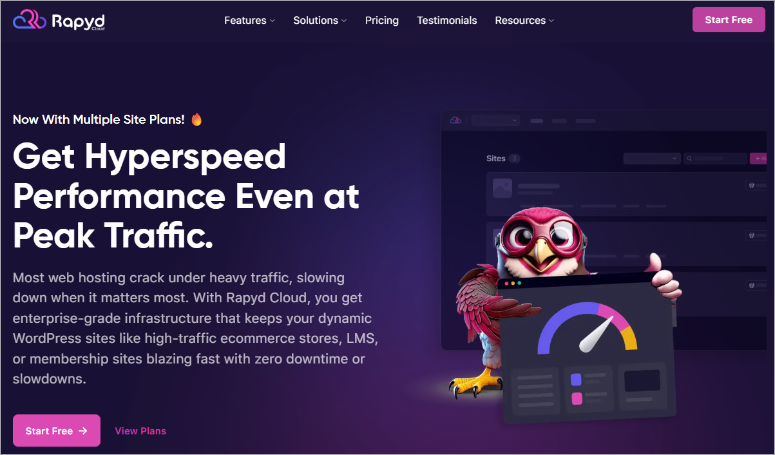
Most hosts rely heavily on caching for speed. But caching doesn’t help logged-in users. When customers check out on your store or members browse your community, they see uncached pages.
That’s where most hosts slow down.
Rapyd Cloud’s infrastructure handles real-time logged-in traffic effortlessly. This makes it perfect for sites where slow checkouts or laggy dashboards directly cost you money.
My Experience
I tested Rapyd Cloud with a WooCommerce demo store to see how it handled checkout pages under load. This is where most hosts struggle because checkout pages can’t be cached for security reasons.
The first thing I noticed was that the dashboard feels clean and intuitive. This resulted in the setup taking about 30 minutes.
Plus, staging environments, version control, and automatic scaling all sit right there without hunting through menus.
What impressed me most was the included premium tools. Object Cache Pro normally costs $95/month by itself. Rapyd Cloud includes its standard, along with Redis caching, CDN, and malware protection.
I simulated 50 concurrent users adding products to cart and checking out simultaneously. Most hosts start showing delays around 20 concurrent users. Rapyd Cloud handled all 50 without slowdowns.
The checkout process stayed fast even during the stress test, and pages loaded in under a second throughout. For an online store, that responsiveness during checkout directly impacts conversion rates.
Most impressively, the dynamic scaling feature kicked in automatically when traffic spiked.
I didn’t configure anything. The system detected increased load and allocated more resources instantly. When traffic dropped, it scaled back down.
Free migration included professional help. Their team moved my test site and optimized it for their platform with zero downtime during the transfer.
Support impressed me with their technical knowledge. They understood WooCommerce-specific challenges and offered solutions beyond generic hosting advice.
Performance Testing
Concurrency Master Focus: Rapyd Cloud excelled at handling simultaneous logged-in users without performance degradation.
- Load time: 270 ms
- Uptime: 100% (perfect reliability
- Support rating: 10/10
- Concurrency: 12,000 requests handled with 8.51 ms response time
With Rapyd Cloud, my priority was to see how it handled traffic surges, to see how effective its dynamic scaling is.
The k6 Load Impact test showed that it handled 12,000 requests with sub-10 ms response times, which is exceptional. Most budget hosts start failing at a fraction of that load.
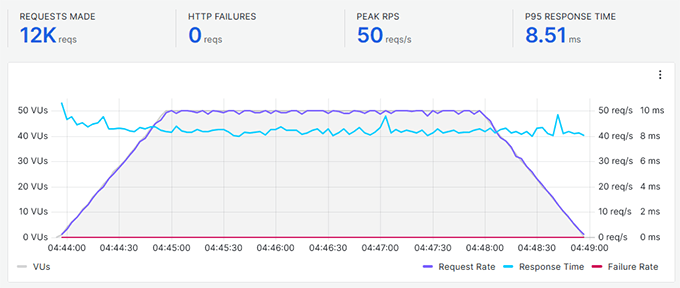
►Pros
- Handles high concurrent users without slowdowns or lag
- Includes Object Cache Pro, Redis, CDN at no extra cost
- Perfect for WooCommerce stores and membership sites
- 100% uptime with free professional site migration
►Cons
- Premium pricing – not for hobby sites
- No free domain name included with plans
- Base plan limited to 10GB storage space
My Verdict
Choose Rapyd Cloud if you’re running a membership site, online store, or community platform where logged-in user performance matters. The included premium tools and high-concurrency handling justify the cost for businesses that can’t afford slow checkouts or laggy member areas.
Pricing: From $29/month
11. Liquid Web ⭐⭐⭐⭐
Liquid Web is a leading managed hosting company that specializes in WordPress, WooCommerce, and premium business solutions.
Quick Overview:
- Enterprise-grade
- Best for: Managed VPS & dedicated needs
- Pricing: From $4/month
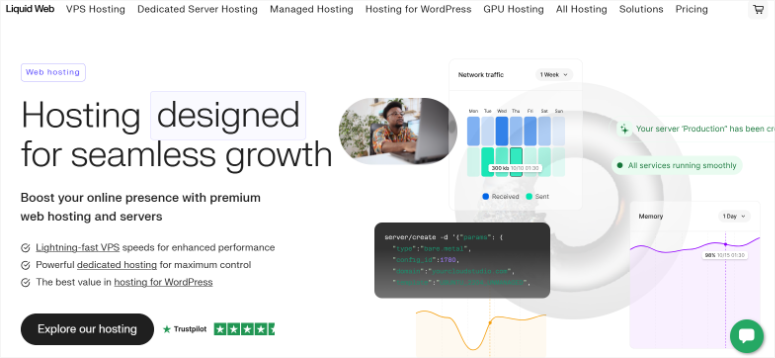
Unlike hosts focused only on shared hosting, Liquid Web operates in the managed VPS and dedicated server space. This gives more flexibility to small businesses, but you need some technical experience.
They’ve partnered with Amazon Web Services and Google Cloud Platform to deliver enterprise-level hosting infrastructure.
This means your site runs on the same cloud technology powering major corporations.
What sets Liquid Web apart is its automatic plugin updates. Most managed host services update WordPress core but leave plugins alone.
Liquid Web updates everything automatically, protecting you from vulnerable plugins.
My Experience
I tested Liquid Web with a high-traffic client site that had outgrown shared hosting. They needed more resources but didn’t want to manage servers themselves.
The setup felt more involved than typical shared hosting. You’re configuring a VPS environment, which means choices about server resources, backup frequency, and security settings.
This control is valuable but requires more technical understanding.
The automatic plugin updates impressed me. I installed several popular plugins and watched Liquid Web update them automatically overnight. On top of that, security patches were applied without me lifting a finger.
The no-traffic-limit policy removes a major worry. Liquid Web handles surges without penalties or slowdown warnings.
I tested their WooCommerce optimization with a demo store. Product pages loaded faster than the same store on standard WordPress hosting.
This is because their servers are tuned specifically for WooCommerce’s database-heavy operations.
Support quality exceeded expectations. Chat agents understood server architecture and could troubleshoot complex issues. This level of expertise costs more but saves time when problems arise.
The one-click staging tool made testing changes risk-free. I could try new plugins, update themes, and experiment without touching the live site.
When everything worked, pushing changes to production took one click.
Performance Testing
Managed VPS Excellence Focus: Liquid Web’s automatic updates and no-traffic-limit policy stood out for high-traffic business sites.
- Load time: 901 ms
- Uptime: 99.99%
- Support rating: 10/10
- Unique feature: Automatic plugin updates (rare in hosting)
For Liquid Web, I focused on the server response time using PageSpeedPlus to analyze their VPS servers. I recorded server response times of under 600 ms in the U.S. and Europe.
This is great, considering I did not use any CDNs.
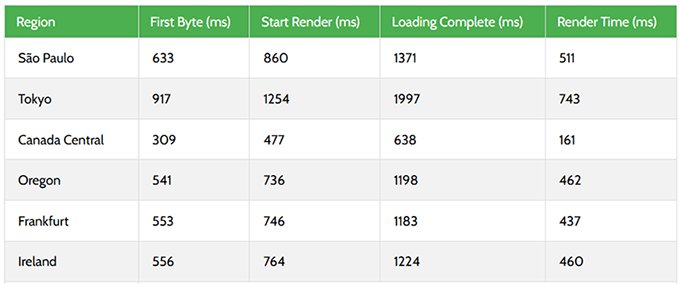
►Pros
- Managed VPS removes server maintenance headaches completely
- Automatic plugin updates protect against security vulnerabilities
- No traffic or pageview limits even during major spikes
- WooCommerce-optimized servers handle database queries efficiently
►Cons
- Hosting discount only applies for first 3 months
- No unmanaged hosting option for cost-conscious developers
My Verdict
Choose Liquid Web if you’ve outgrown shared hosting and need managed VPS power without technical server management. Perfect for established businesses, busy WooCommerce stores, and agencies managing multiple client sites. The automatic plugin updates alone save hours of monthly maintenance.
Read our complete Liquid Web review for all details. Plus, check our Liquid Web coupon page for current deals.
Pricing: From $4/month
There you have it! My list of the best web hosting companies for small businesses. But we are not done yet. Below are hosting providers that just missed this list.
Honorable Mentions: More Hosting Options
These hosts didn’t make our top 11, but they’re worth knowing about depending on your specific needs.
GreenGeeks
Best for: Eco-conscious businesses | Starting from: $.95/month
GreenGeeks is the industry’s leading eco-friendly hosting provider. They put back three times the power they consume into the grid through renewable energy credits.
Performance-wise, they deliver solid SSD storage and decent speed. Load times averaged 697 ms during our testing, which is respectable for the price point.
The catch? Uptime came in at 99.90%, lower than our top picks. That translates to about 7 hours of downtime per year compared to just 52 minutes with the best performers.
Choose GreenGeeks if environmental impact matters to your brand. The 300% green energy commitment is genuine, and performance is adequate for most small business sites.
Check out my detailed GreenGeeks review here.
Check out our GreenGeeks coupon page for deals | Get started with GreenGeeks »
WP Engine
Best for: Premium managed WordPress | Starting from: $23/month
WP Engine pioneered managed WordPress hosting and remains one of the premium options. They deliver excellent performance with 582 ms load times and 99.99% uptime.
Their partnership with AWS and Google Cloud Platform provides enterprise-grade infrastructure. You can expect automatic updates, staging environments, and expert WordPress support to come standard.
So why didn’t WP Engine make our main list? Rapyd Cloud delivers similar performance and features at a better value.
For $29/month, Rapyd Cloud includes Object Cache Pro and handles high-concurrency traffic better, making it the smarter choice for most small businesses needing premium hosting.
Choose WP Engine if you specifically want their brand reputation or have existing relationships with them.
Check our WP Engine coupon page for deals | Get started with WP Engine »
Now that you’ve seen all the hosting options, let’s talk about choosing the right one for your specific business needs.
If you like the deals above, check out our complete coupon page here for even more offers.
How to Choose the Right Hosting for Your Small Business
Picking the right host doesn’t have to be complicated. Start by matching your actual needs to what each host does best.
Here’s how to think through your decision.
Start with Your Current Needs
Don’t buy hosting for the business you hope to have in three years. Buy for the business you have today. You can always upgrade later.
Traffic volume expectations:
- Just starting out? Get shared hosting. It handles up to 10,000 monthly visitors easily.
- Growing business with 50,000+ visitors? Look at managed WordPress or VPS hosting options.
Technical skill level:
- Never touched a server setting? Choose beginner-friendly hosts like Bluehost or Hostinger.
- Comfortable with SSH and Git? Hosting.com gives you developer tools.
Budget reality:
- Be honest about what you can afford monthly. The $1.99/month promotional rate jumps to $7-12/month at renewal. Factor that into your decision.
- If you want to avoid renewal shock, look at DreamHost or SiteGround. Their renewal increases are gentler than hosts that triple prices after the promotional period ends.
Growth timeline:
- Planning slow, steady growth? Hostinger lets you scale from shared to VPS smoothly.
- Expecting rapid expansion? Start with scalable options like Liquid Web.
Key Factors to Prioritize
To choose a web hosting provider for your small business, there are a few different factors you’ll need to consider:
- Uptime (reliability)
- Load time (speed)
- Features
- Support
1. Uptime (Reliability)
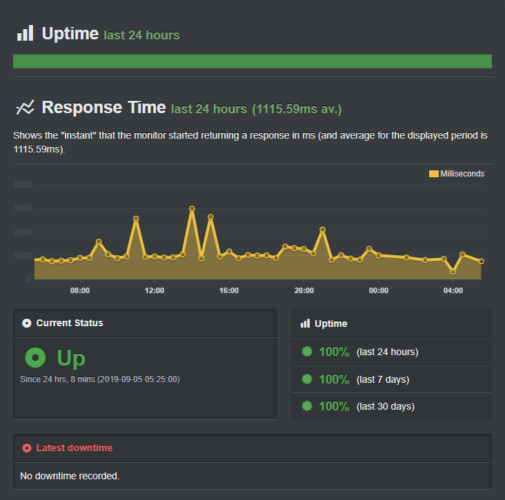
You’ll need to choose a reliable web hosting provider that guarantees maximum uptime. Uptime is a term used to describe the period your website hosted on a specific server type is available online.
Usually, uptime is expressed as a percentage of the total available time, which is 365 days per year.
For example, a website that’s up all year long, 24/7, is said to have 100% uptime. If uptime is 99%, that means the website is down for 3.65 days.
While no web host can guarantee 100% uptime, anything below 99.9% is unreliable.
Some hosting services offer a refund if they fail to meet their uptime guarantee, but that doesn’t cut it because every downtime is going to cost you.
📜Pro Tip: To get you started, IsItWP offers a free uptime checker you can use to see your website’s performance.
2. Load time (Speed)
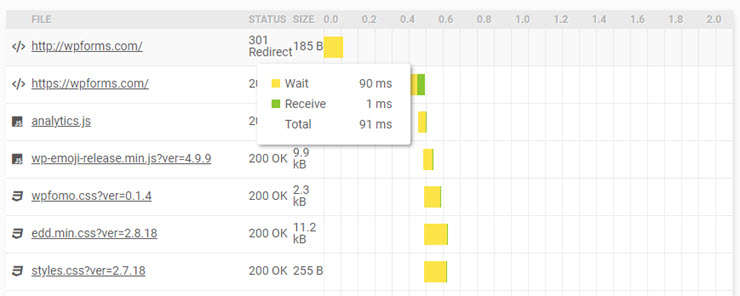
Google continues to emphasize page speed in its algorithm, which makes it one of the most important factors to consider when choosing a web host.
While you can find tons of tips and tricks on the web like CDNs and caching to boost your page speed, none of them are going to help you if your site is hosted on a slow hosting server.
If you want to build a fast website, the first thing you need to do is to find a web host that doesn’t slow down your site.
📜Pro Tip: You can couple the website uptime checker tool mentioned above with our free speed tester tool to have a complete picture.
Not only that, we’ve created a test page and run speed tests for web hosting comparison with different testing tools such as Pingdom and Load Impact.
3. Features
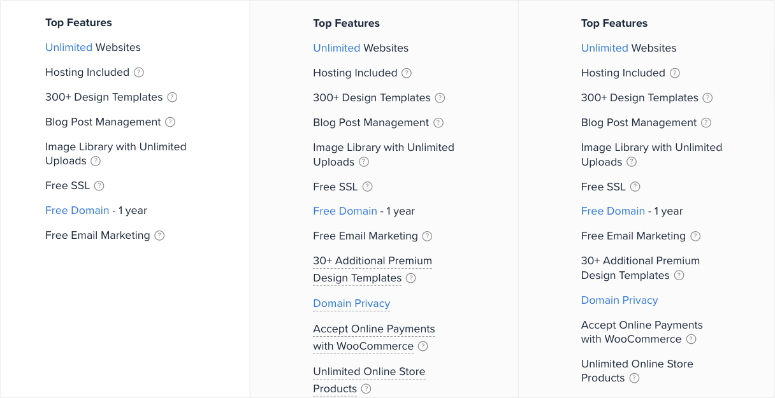
Every web hosting service is unique in terms of features. Below are some standard features you’ll find on almost every popular web hosting provider.
The key to choosing the best hosting provider is to figure out whether they come with the right set of features you’ll need.
- 1-click script install: It helps you easily install website scripts like WordPress, Joomla, etc. on your host.
- Website builder: While most hosting providers offer a website builder as a standard feature, not every builder is created equal. For example, some web hosts only allow you to build basic websites with their builder, whereas others even let you use AI to create a complete site.
- Control panel: Examine how your web host lets you manage your hosting account. The most popular control panel is cPanel, but you can also find providers that offer a different web-based control panel.
- Number of domains: The pricing is usually based on the number of domains you can use with a specific hosting plan.
- Disk space and bandwidth: Site hosting companies often advertise that they offer unlimited resources like disk space and bandwidth with their shared hosting plans. But, you’ll have usage restrictions on how you use the resources for your site. When you’re signing up for a service, you’re obliged to adhere to the terms of services of your hosting company. And based on the terms, you’ll only be allowed to use server resources for the normal operation of a small website.
- Email address: Some web hosting companies allow free email accounts but they also limit the number of email addresses you can set up on your hosting account. You might want to review their email hosting features as well before you dive in to choose a hosting service.
- Free domain: Companies often offer a free domain while purchasing a new web hosting account. Your hosting company will cover the registration fee of your domain name for the first year. Keep in mind that if you purchase a domain name from a domain registrar like NameCheap.com, you could save your money on the renewal price in the long run.
- Free SSL: SSL is an industry-standard security measure that creates an encrypted link between your visitor’s browser and your website. Installing SSL certificate on your site will add a small green padlock icon on your address bar, which makes your site look trustworthy. Similar to the free domain offer, some web hosting providers also offer a free SSL certificate when signing up for their hosting plan.
- Built-in security – Aside from SSL, many web hosting providers offer free security options like malware scans and backups to protect your site against hackers.
4. 24/7 Support
At some point in time, you’ll need support for data transfers, backups, migration, SSL, downtime, and similar situations.
24/7 support is a standard feature offered by almost all popular web hosting providers. Support is typically offered via 3 options: phone, ticket-based email, and live chat.
Remember, double-check whether your hosting service offers email support for technical assistance.
Email or ticket-based support is needed if you want assistance with advanced issues that may take a bit longer to resolve. This way, you don’t have to waste your time on Live Chat seeking assistance.
Similarly, another thing you’ll need to take a look at is whether your hosting provider offers live chat support throughout the day.
Choosing the Right Hosting Plan
Most top web hosting providers offer different types of hosting plans. Wondering which one is the best choice for your website’s needs? Let’s take a look at a few different web hosting plans:
Shared / Cheap Hosting: For New Websites with Low Traffic Volume
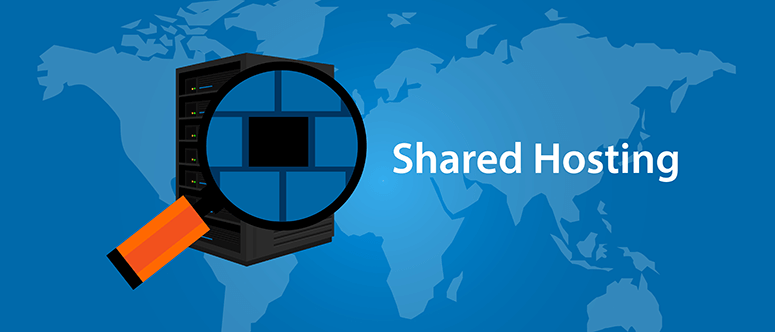
Cheap hosting, also known as shared hosting, is sufficient to run a new website with low traffic volume.
In a shared hosting environment, your website shares server resources, including CPU, RAM, etc. with other websites hosted on the same web server.
This is how hosting providers can keep costs low. Although you share hosting resources with other sites, your website will be secure, and only you’ll be able to access your website files.
And the best part is you can always upgrade to VPS plans or other costly hosting plans if you think your current hosting account isn’t capable enough to survive frequent traffic surges as your needs evolve.
Often, shared hosting boasts unlimited disk space, unlimited bandwidth, unlimited domains, and basically unlimited everything.
While they claim to offer unlimited resources, you’re required to be fully compliant with your hosting company’s Terms of Service.
Plus, you will need to utilize only disk space and bandwidth in the normal operation of a personal or small business website.
You’ll be asked to upgrade your hosting option in case your site exceeds its usage policies.
VPS Hosting: For a Growing Website That Can’t Justify Having a Dedicated Web Server

As your website grows and your needs evolve, you might need more control and flexibility over your hosting server. This is where VPS comes in.
VPS is short for Virtual Private Server. With VPS, while you’ll still be sharing hosting resources with other sites, you’ll get a lot more dedicated power and flexibility for your site.
VPS is the best bet for you if you want to create websites with more secure data or build resource-heavy applications that are growing through rapid expansion.
Virtual Private Server plans often come with an improved control panel interface that gives you more control over your server, along with many special tools for VPS management.
Some hosting providers offer managed and unmanaged virtual private server (VPS hosting) for different pricing plans.
WordPress Hosting: For WordPress Sites

Looking to build a website with WordPress, but don’t want to undergo the unnecessary installation process? Then, you might subscribe to a managed WordPress hosting plan.
Web hosting companies offer different WordPress hosting options, like cheap WordPress hosting, managed WordPress hosting, etc.
With managed WordPress hosting, you can easily get started with your WordPress site without the unnecessary step of manual WordPress installation.
You’ll also get an optimized WordPress hosting account that prevents WordPress-specific malicious attacks and vulnerabilities out of the box.
Managed WordPress hosting could be the best choice for you if you don’t want to perform site maintenance yourself.
But, want to seek assistance from WordPress-specific support experts whenever you need help.
Dedicated Server Hosting: For Extremely High Traffic Website
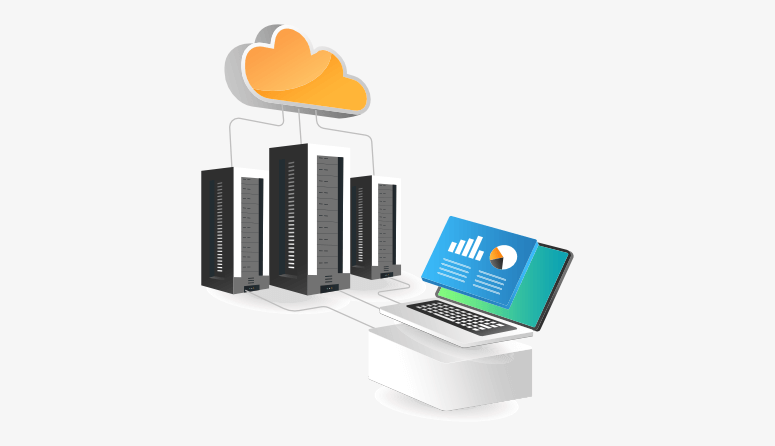
If you want to host an extremely high-traffic website without sharing your server resources with other websites, you might choose a high-quality dedicated server hosting.
With dedicated hosting, you get a complete server for your sole use for lease from your hosting provider. This way you’ll get more control over the server’s hardware and operating system.
Dedicated server hosting is expensive whether you take an annual or per-month plan.
Aside from that, if you do not employ a system administrator or have no experience with servers, then I recommend that you get a managed dedicated server.
Alongside doing software updates, they also do server monitoring, offer phone support, etc. Most top websites use clusters of dedicated servers.
Recap: Which is the Best Web Hosting Company for Small Businesses?
Now, to summarize everything we have discussed above, I have created a quick table with test results to help you make your final decision.
| Hosting Provider | Load Time | Uptime | Support Rating | Best For | Starting Price |
|---|---|---|---|---|---|
| 🥇 Hostinger | 374 ms | 99.99% | 10/10 | Budget + Performance | $2.99/month |
| 🥈 SiteGround | 417 ms | 99.98% | 10/10 | Speed & Security | $3.99/month |
| 🥉 Bluehost | 689 ms | 99.98% | 9/10 | Beginners | $2.99/month |
| 4. DreamHost | 445 ms | 99.90% | 7/10 | WordPress Sites | $2.99/month |
| 5. HostGator | 691 ms | 99.96% | 10/10 | Easy Setup | $2.99/month |
| 6. Hosting.com | 438 ms | 99.90% | 9/10 | Developers | $1.99/month |
| 7. InMotion Hosting | 982 ms | 99.93% | 9/10 | Business Reliability | From $3.29/month |
| 8. WordPress.com | 636 ms | 100% | 8/10 | Managed Convenience | From $4/month |
| 9. Rocket.net | 291 ms | 99.94% | 9/10 | Performance Sites | $30/month |
| 10. Rapyd Cloud | 270 ms | 100% | 10/10 | High-Traffic Stores | $29/month |
| 11. Liquid Web | 901ms | 99.99% | 10/10 | Enterprise Needs | From $4/month |
My Top 3 Recommendations by Use Case
From the table, this is what you learn.
Best Overall for Small Businesses: Hostinger
- Why: Perfect balance of affordability, performance, and scalability. You get solid speed 374 ms, great uptime (99.99%), and the ability to upgrade from shared to VPS without switching companies.
- Who it’s for: Most small businesses starting out or growing steadily. Budget-conscious but serious about performance.
Best for Speed & Security: SiteGround
- Why: Fastest load times tested at 417 ms with Google Cloud infrastructure and built-in security features. Advanced caching and daily backups protect your business while delivering lightning-fast performance.
- Who it’s for: Businesses where site speed impacts conversions. Small online stores need security. Growing service providers with traffic spikes.
Best for WordPress Beginners: Bluehost
- Why: Official WordPress.org recommendation with one-click installs and a guided setup wizard. Includes free domain, SSL certificate, and 24/7 phone support for peace of mind.
- Who it’s for: First-time website owners building WordPress sites. Small businesses without technical staff. Entrepreneurs need reliable support while learning.
The right hosting choice depends on where your business is today and where it’s headed. Start with one of these three recommendations based on your primary need. You can always upgrade as you grow.
FAQs: Top Web Hosting for Small Businesses
What is web hosting and why do small businesses need it?
Web hosting is where your website’s files live online. Think of it like renting space for your store. Without hosting, your website can’t exist on the internet. When visitors type your domain name, the hosting company delivers your site to their browser. Every business website needs hosting to be accessible to customers online.
How much should I budget for small business hosting?
Most small businesses thrive on $3-10 monthly hosting plans when starting. Growing businesses typically spend $10-30 monthly as traffic increases. Premium hosting above $30 monthly makes sense only for high-traffic sites where speed directly impacts revenue. Start affordable and upgrade when your traffic actually justifies the cost.
What’s the difference between shared and managed WordPress hosting?
Shared hosting means multiple websites share one server, keeping costs low for small sites. Managed WordPress hosting handles updates, backups, and security automatically but costs more. Choose shared hosting if you’re comfortable with basic maintenance. Choose managed hosting if you prefer hands-off technical management and have the budget.
Can I switch hosting providers if I’m unhappy?
Yes, switching hosts is straightforward. Most reputable providers offer free migration services or easy transfer tools. Many include generous money-back guarantees so you can test their service risk-free. Popular hosts like SiteGround and Bluehost handle migrations smoothly, typically completing transfers within 24-48 hours with minimal downtime.
Should I buy my domain from my hosting provider?
Not necessarily. Many hosts include one free year of domain registration, making it convenient to manage everything in one account. However, buying separately from domain registrars often costs less for long-term renewals. Choose based on whether you value convenience or long-term cost savings more.
Do I need managed WordPress hosting as a beginner?
Probably not. Beginners usually do fine with regular shared hosting that includes one-click WordPress installation. Managed WordPress hosting costs significantly more for automated maintenance that you can easily handle yourself. Save your budget for other business needs. Upgrade to managed hosting later when time becomes more valuable than money.
Final Verdict: Best Hosting for Your Small Business
Remember my SEO blog that was dying from slow hosting? That experience taught me the most important lesson about web hosting: your server is the foundation of everything.
You can optimize images perfectly, install the best caching plugins, and minify every line of code. None of it matters if your hosting is fundamentally slow.
I wasted months trying to fix performance issues that weren’t fixable. The problem wasn’t my site. It was the cheap hosting I’d chosen to save a few dollars.
When I finally switched to better hosting, the change was immediate. Same site, same content, and same optimization. But suddenly, pages loaded in under a second instead of over four.
That’s when I understood: cheap hosting costs you more in lost customers than you save on monthly fees. Use this list of the best web hosting platforms for small businesses so you don’t make the same mistake I did.
Resource Center
Now that you’ve chosen your hosting, here are guides to help you build a successful website:
- How to Make a Website Step by Step – Complete beginner’s guide to launching your first site
- How to Start a Blog and Make Money – Turn your blog into a profitable business
- How to Create an Online Store – Launch your eCommerce business on WordPress
- Ultimate WordPress Security Guide – Protect your site from hackers and malware
- Best WordPress Plugins for Small Business – Essential tools to grow your website
- WordPress Speed Optimization Guide – Make your site blazing fast
- How to Switch Web Hosts Without Downtime – Migrate safely if you need to change hosts
These tutorials will help you maximize your new hosting and build a website that actually grows your business.
